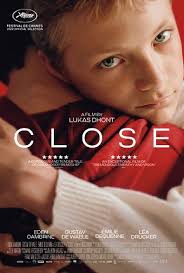
Dreaming is a good thing. Rural Belgium, the present day. 13-year-old Léo (Eden Dambrine) and Rémi (Gustave De Waele) are best friends who exhibit a deeply intimate affection for one another. They play imaginative games, build forts and have a habit of sleeping in the same bed in only child Rémi’s bedroom. Rémi’s parents Sophie (Emilie Dequenne) and Peter (Kevin Janssens) accept this and love Léo like a second son. Léo’s family helps run agricultural work on a flower farm where he and Rémi like to play together. Are you together? Starting at secondary school where they hang out together as usual a trio of female classmates openly ask if the boys if are a couple. Léo vehemently denies it and claims they are like brothers while Rémi does not comment. Léo becomes uneasy with this public perception, exacerbated by homophobic slurs directed towards him by the giggling girls and a few other boys. Fearing being ostracised, he begins new friendships and takes up ice hockey, from which he deliberately excludes Rémi who is a gifted musician playing clarient now isolated in the school yard. One night, while sleeping over at Rémi’s, Léo decides to sleep on a separate mattress. When he wakes up, he finds Rémi sleeping on the same mattress as him. Léo becomes aggressive, leaving Rémi hurt and confused. Léo becomes progressively distant from Rémi, despite Rémi’s persistent attempts at interaction. He stops sleeping over, starts riding his bicycle to and from school with other students instead of Rémi, continues playing ice hockey and spends more time working with his family at the farm. Rémi finally confronts him and he acts defensively. Distraught and angry, Rémi attacks Léo and the two fight. They have nothing to do with each other and even though Léo knows it’s wrong he won’t tell Rémi why and keeps his distance. One day, after a school trip from which Rémi is absent, when the bus returns home the class is informed that their parents are waiting for them. They think it’s for misbehaviour but Léo’s mother Nathalie (Léa Drucker) confirms her son’s suspicion that Rémi has killed himself, which Léo believes his withdrawal caused. Do you think he suffered? He closes off his emotions from everyone else, unable to talk to anyone about it during the class therapy sessions offered by the school. He goes to Rémi’s home months after Rémi’s parents broke down in his own home over family dinner but he can’t confess to Sophie the reason for his best friend’s suicide … I pushed him away. This tragic portrait of friendship at a crucial age is tender and moving, a devastating instance of children’s thoughtless and casual cruelty leading to a terrible tragedy. Written by Angelo Tijssens & director Lukas Ghont, this covers the transition to secondary school which brings unprecedented pressures to twelve- and thirteen-year olds previously not exposed to sexual innuendoes, vicious peer pressure and the misunderstandings attributed to physicality. There is a subtle suggestion that of the two pre-sexualised boys, Rémi has a sense of what it is that might underline their deep connection while the more outgoing Léo immerses himself in the hyper-masculine world of ice hockey to establish his supposed individuation. The inability of these young boys to articulate things they can’t yet understand in an atmosphere of conformity where you have to be ‘normal’ to fit in is smartly evoked – there are many close-ups of these newcomers’ faces as they handle notions of friendship and then separation in their different ways. Léo wears a mask when he’s rushing around the ice rink, Rémi’s feelings are always etched on his sensitive face. Léo shows up to Rémi’s music recital but when Rémi returns the favour at a hockey match Léo is horrified and rebuffs his vulnerable friend: the die is cast. Shooting mostly at magic hour, cinematographer Frank van den Eeden’s observational naturalistic style finds the spaces and angles to hem in these children even running in the widest field of flowers while the indoors scenes focus on the boys’ closeness. The point at which these lives intersect is all too easily prised apart by dullard judgmental teens. There is an idea of class difference suggested by the architecture – the modernist home where Rémi’s talents are nurtured, the more working class environment which sees Léo contributing to the family’s efforts to bring in the dahlia harvest. Both boys are equally at home in both houses, each has a place in the other’s family group. Léo’s role as Sophie and Peter’s second son and his sudden distancing from them following Rémi’s death is surely dramatised. Where do you put a broken heart? How can you explain it? At therapy in school the very boys who led Léo to scorn his soulmate are the ones who claim kinship: he can’t take it. The score by Valentin Hadjadj emphasises, leads and follows the soaring emotions where appropriate as the drama zeroes in on Léo and his response to the unthinkable shock of his friend’s terrible self-destruction. The only weakness he can project is the pain he is experiencing after breaking his arm on the ice, a plaster cast the only visible and acceptable sign of his distress. How this story of joyful boyhood exuberance curdles into devastating loss is not easily forgotten. This won the Grand Prix at Cannes 2022 (sharing the prize with Stars At Noon from Claire Denis). It’s intense and extraordinary. What happened between you two?